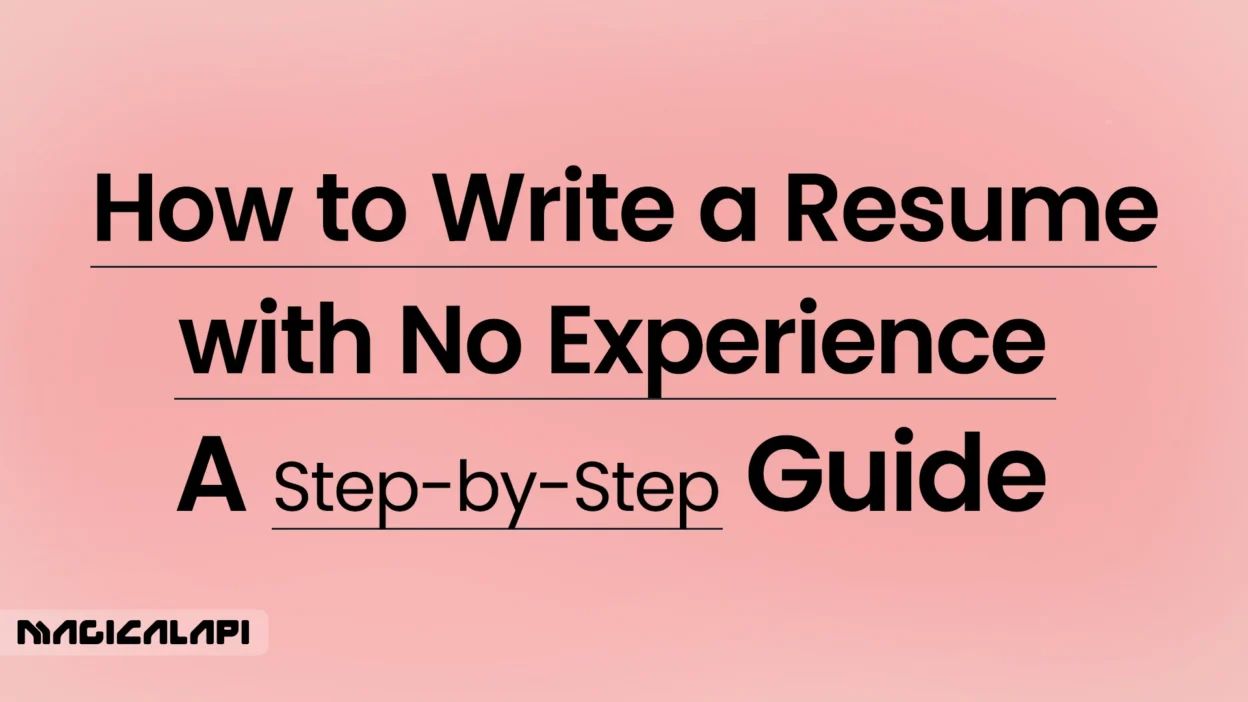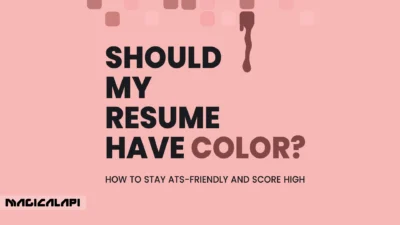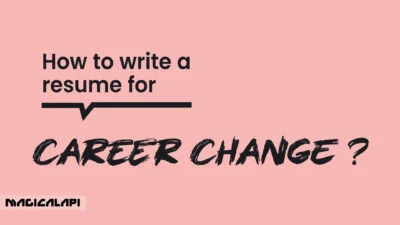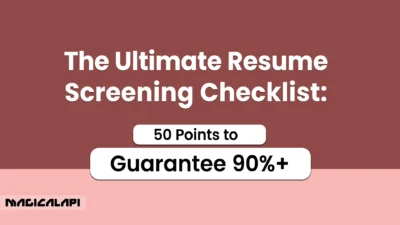Stuck in the conventional career seeker’s dilemma? You need experience to get employed, yet an employment to get experience. It is a simple barrier, but one that is easily overcome. Your first and most vital tool throughout this endeavor is a clean-written resume. Maybe you are starting out with an inexperienced resume, but this document is your key to getting off to the right start.
This guide will walk you through writing a no-experience resume that capitalizes on your potential and makes hiring managers take a second look. We’ll discuss it all from determining the ideal format to emphasizing your own strengths, so you’re completely clear on how to write a no-experience resume that not only stands on its own, but shines.
Table of Contents
Why You Need a Resume Even with No Experience
It’s natural for most individuals starting their career wonder, “Do I need to make a resume if I possess no traditional work experience?” The answer is an overwhelming YES! A resume is far more than a list of prior experience. It’s an expert marketing tool that provides an overview of your skills, your schooling, your drive, and your potential.
For an individual with a resume with no experience, it’s your golden opportunity to demonstrate the qualities and intrinsic skills that hiring managers are specifically searching for. Creating one is a show of proactivity, depicts professionalism, and signals your seriousness in working. Consider your resume to be the first chapter of your career book – make it interesting! If you’re unfamiliar with resumes, reading an article on “What is a resume?” may provide it with some context.
Choosing the Right Resume Format for Beginners
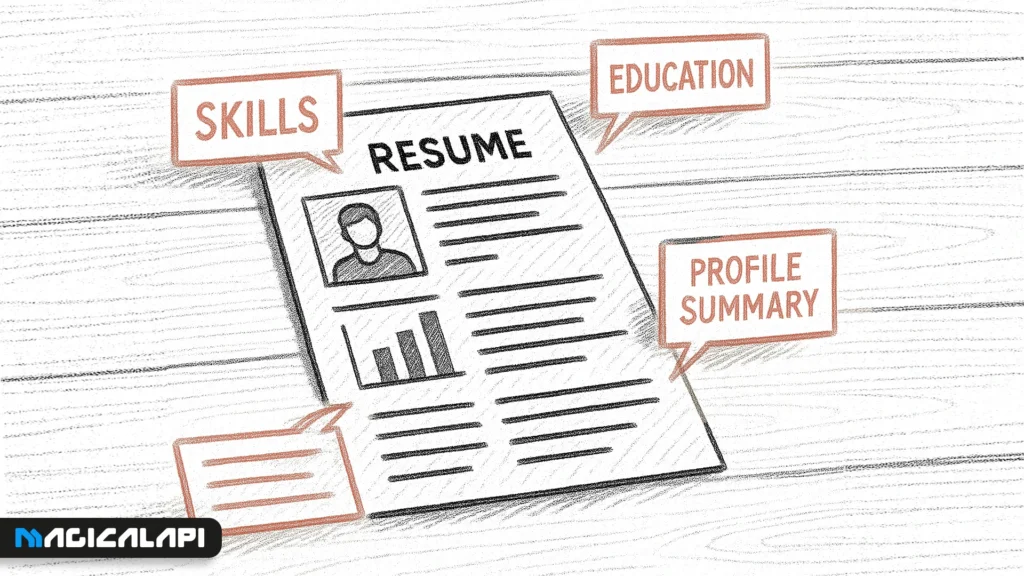
When you’re attempting to figure out how to write a resume with no experience, the resume format you choose is vital. It has to focus on your strong points. The following are the main options:
- Chronological Resume: This format lists your work experience in reverse chronological order (most recent job first). While it’s the most traditional format, it can be challenging to use to your advantage in the event that you have a limited formal employment history.
- Functional Resume: This format emphasizes more of your skills and abilities rather than a chronological work history. It can be an excellent choice for a work experience-free resume because you can lead with what you can provide an employer.
- Combination (Hybrid) Resume: This format is a blend of chronological and functional styles. It usually begins with a strong summary of qualifications, followed by experience (which can encompass non-traditional work, projects, and volunteer work).
For the majority of first-time entrants, a combination or functional resume format is the most intelligent choice. These styles allow you to draw attention to your applicable qualifications, academic achievements, and diverse experiences like volunteer activities or significant personal projects, rather than inadvertently creating attention for a lack of paid employment.
Magical Resume Checker
Discover the full potential of the Magical Resume Checker and explore the various options available to enhance your resume, optimize it for applicant tracking systems (ATS), and improve your chances of landing your dream job.
Major items to include, no matter what your chosen format:
- Contact Information: Your full name, professional telephone number, professional email address, and optionally, your LinkedIn profile URL or link to an online portfolio if applicable.
- Resume Objective or Summary: A 2-3 sentence summary that clearly sets forth your career objectives and emphasizes your most compelling skills and passion.
- Education: Full details about your academic background and degree.
- Skills: A special section to identify both your technical (hard) skills and interpersonal (soft) skills.
- Relevant Experience (broadly defined): You put internships, volunteer experience, significant academic or personal projects, freelance activities, or part-time work here, even if unrelated to your field.
- Optional (But Frequently Useful) Sections: Awards and honors, certifications, language skills other than English, significant coursework, or significant extracurricular activities.
Crafting a Compelling Resume Objective or Summary
Because you are creating a resume with no work experience, your resume summary or objective is your headliner. This brief but powerful opening section on your resume is your professional elevator speech.
- Resume Objective: Tends to be better for individuals with no or minimal experience or those who are changing careers entirely. It states your career goals and how you’re looking to work in the specific role you’re applying for, emphasizing your passion and transferable skills.
- Example: “Diligent and strongly driven recent [Your Level, i.e., High School/College] graduate with a good background in [mention 1-2 strong skills like customer service, research, or specific software] and a proven interest in [mention the industry], eager to enter an entry-level [Job Title] position at [Company Name] to apply problem-solving abilities and work in a team environment.”
- Example: “Diligent and strongly driven recent [Your Level, i.e., High School/College] graduate with a good background in [mention 1-2 strong skills like customer service, research, or specific software] and a proven interest in [mention the industry], eager to enter an entry-level [Job Title] position at [Company Name] to apply problem-solving abilities and work in a team environment.”
- Resume Summary (or Professional Profile): If you have some relevant experience (not necessarily paid, like extensive volunteer work or complex projects) or a solid portfolio of transferable skills, this kind of resume summary is a safe bet. It spots and highlights your most critical qualifications, experiences, and achievements early on.
- Example: “Highly driven and persistent individual with demonstrated communication, project management, and analytical abilities gained through extensive volunteer leadership and challenging coursework at the university level. Eager to apply strong academic credentials in [Your Field of Study] and a desire for results-oriented data in a junior [Job Title] role at [Company Name].”
Key Tip: Make sure to modify this section for each and every position you’re applying to. Naming the company or the position itself indicates genuine interest and effort, as well as making your application stand out.
Your SAT Score on Resume can be more than a college‑entry footnote—it can spotlight your analytical grit and test‑day composure to employers who value data‑driven thinking. Framing the score alongside coursework or achievements shows you embrace challenges and excel under pressure—a quality that translates to deadlines, client pitches, and problem‑solving sprints at work. Want to showcase your own standout score? Update your resume now and let recruiters see the numbers behind your potential.
Highlighting Transferable Skills on a No-Experience Resume
Transferable skills are the secret ace when you’re learning to make a resume with no experience. They’re skills and pieces of knowledge that translate to any type of job and career. Consider all of your life experiences – class work, personal activities, volunteer activities – where you’ve gained these valuable skills.
Key transferable skills to consider and showcase:
- Communication (Verbal & Written): Evidence of class presentation, group assignments, essays, debate clubs, or customer service volunteer work.
- Teamwork & Collaboration: Achieved through participation in sports teams, class group work, ensemble performance, volunteer committees, or club participation.
- Problem-Solving & Analytical Thinking: Built by solving complex academic problems, coding personal projects, repairing issues in extracurricular activities, or even strategic gaming.
- Leadership & Initiative: Demonstrated by captaining a sport team, president of a student organization, coordinating a community project, or even actively working out a problem in a group setting.
- Time Management & Organization: Required in order to effectively balance studies, part-time work (if employed), personal commitments, and deadline-oriented projects.
- Adaptability & Flexibility: Expressed by successful adaptation to new environments (e.g., moving to a new school or city), learning new applications with efficiency, or adapting to changing project requirements.
- Critical Thinking: Exercised while re-searching information for papers, evaluating sources, or making knowledgeable decisions in volunteer work.
- Digital Literacy & Technical Skills: Proficiency in a software suite (Microsoft Office, Google Workspace), industry-specific software (e.g., Canva, basic HTML/CSS, research databases), social media management, or data entry.
- Creativity & Innovation: Expressed through written work, creative exercises, creating novel solutions to problems, or brainstorming novel concepts for a club or project.
- Work Ethic & Responsibility: Reflected by consistent dedication to studies, dedication to volunteer work over several years, favorable teacher or informal employer report, or personal achievements that require discipline.
How to introduce them impressively: Instead of just saying “Leadership,” provide a concise, impactful example: “Demonstrated leadership by organizing and conducting weekly meetings of a 15-member college debate team, resulting in a 30% rise in participation in regional competitions.” This provides concrete evidence and credibility.
Leveraging Education, Coursework, and Certifications
For a first-time resume with no experience, your education section is also going to become the highlight. Make it sparkle!
- Order: Always lead with your most recent degree (reverse chronological order).
- Important Info to Include:
- Full Name of Institution
- Degree Earned (e.g., Bachelor of Science in Computer Science, High School Diploma with Honors)
- Graduation Date (or Expected Graduation Date – e.g., “May 202X”)
- Location of Institution (City, State)
- GPA (Optional: Include if it is excellent, typically 3.5/4.0 or higher, or whether the employer has requested it).
- Enhancing Your Education Section:
- Relevant Coursework: Do not just list your degree; include actual courses that are applicable to the position you are applying for. For instance, applying for a junior marketing role, include “Digital Marketing Foundations,” “Consumer Behavior,” or “Marketing Analytics.”
- Major Academic Projects: Describe major projects, especially those where you designed or applied the relevant skills. Bullet point. Example: “Led a team of 4 on a semester-long capstone project to develop an in-depth marketing plan for a local non-profit, including market research, SWOT analysis, and formal presentation of recommendations.”
- Awards and Honors: Include Dean’s List, academic awards, essay contest awards, membership in an honor society (e.g., National Honor Society), etc.
- Study Abroad or Exchange Programs: If relevant, as these experiences can demonstrate adaptability, independence, and cross-cultural communication skills.
- Certifications Are Key:
If you’ve earned any certifications from online platforms (e.g., Coursera, edX, Google Digital Garage, HubSpot Academy) or other professional organizations (e.g., First Aid/CPR, specialized software certifications), include a standalone “Certifications” section or integrate them with your Education section. For each, list:
- Name of the Certification
- Issuing Organization
- Date Acquired (or “In Progress” with estimated completion date)
Showcasing Volunteer Work and Extracurricular Activities
Don’t underestimate the importance of unpaid experiences! Volunteer experiences and extracurricular activities are effective methods of showing skills, responsibility, commitment, and initiative in your resume with no experience.
- Treat Them Like Professional Positions: For every notable volunteer role or extracurricular activity, include:
- Your Title/Role (e.g., “Volunteer Event Coordinator,” “Secretary of the Coding Club,” “Peer Tutor”)
- Organization/Club/Institution Name
- Involvement Dates
- Key Responsibilities and, more importantly, Achievements (use bullet points and strong action verbs).
- Illustrative Examples:
- Volunteer, Local Food Bank (Sep 2023 – May 2024):
- “Sorted and packaged over 2,000 lbs of donated food items weekly for distribution to community members.”
- “Assisted in coordinating two large-scale food drives, leading to a 15% increase in donations over previous drives.”
- “Provided welcoming and respectful service to clients during food pick-up hours.”
- Treasurer, University Environmental Club (Jan 2023 – Dec 2023):
- “Managed an annual budget of $1,500, maintaining accurate financial records and reporting monthly.”
- “Coordinated a campus recycling awareness drive that increased recycling participation by 25% in three months.”
- “Successfully obtained $300 in additional funding through a college grant proposal.”
- Volunteer, Local Food Bank (Sep 2023 – May 2024):
Emphasize measuring your accomplishments wherever possible. “Planned a fundraising event that brought in $750 for school supplies” is much more effective than simply “Assisted with fundraising.”
Meet MagicalAPI: Your Resume Buddy When You Have No Experience
Challenging you to write your own first resume is a shot in the dark, especially if you don’t have official work experience to draw from. What do you even put on there? How do you convey professionalism without being stiff? And how do you format it all that well, even? That’s exactly where MagicalAPI comes into play; an impressive suite of AI tools for making writing a resume smarter, faster, and a whole lot less painful for newbies.
Instead of beginning from scratch, you can type in whatever you’ve already written down, even a poor first draft, and the Resume Parser will break it into neat, organized sections. It extracts your best material (e.g., education, volunteer work, personal projects, and skills) and presents it to you in a format that hiring software and recruiters can read.
With the Resume Checker or Resume Reviewer, once you have a draft, plug it in and get instant, actionable feedback. It will indicate what’s missing, needs to be shorter, and where you need to add more oomph to your tone in a way that won’t confuse even a beginner resume writer. And then, once you’ve finished and before you hit “send,” the Resume Scorer gives you a score in numbers and tailored feedback on how to make your resume work better. It’s having your own personal career coach for free who works 24/7 and never gets annoyed with reading your resume again for the tenth time.
Whatever you’re applying for internships, entry jobs, or part-time jobs MagicalAPI lets you present yourself confidently and clearly even without any experience at all. No fancy-pants experience required! just your potential, and the right tools to let you show it off.
Understanding Applicant Tracking Systems (ATS) and Keywords
Most firms, particularly large ones these days, employ Applicant Tracking Systems (ATS) to filter through resumes at the front-end. This program reads resumes for specific keywords, talents, and phrases used within the job posting. Without an ATS-friendly designed resume and proper keywords, it may be automatically rejected without even a live recruiter having a chance to see it.
Master strategies for ATS optimization:
- Keyword Alignment: Read the job description carefully. Identify the needed skills, qualifications, responsibilities, and trade-related jargon. Use these same exact words and phrases naturally in your resume, especially in your skill section and job descriptions corresponding to your experience.
- Standard, Simple Format: Utilize plain professional resume templates. Avoid using tables, columns, text boxes, images, headers/footers, and unusual fonts since they are sure to confuse ATS parsers. Standard, widely accepted fonts like Arial, Calibri, Helvetica, or Times New Roman (10-12 point size) are your safest bets.
- Classic Section Headings: Use plain and generic headings that will be recognized by ATS applications as, for example, “Education,” “Skills,” “Professional Experience,” or “Volunteer Experience.”
- File Type Restrictions: If there are no guidelines for the application, use PDF when saving your resume so that your structure remains intact on different devices. Older ATS might still like .doc or .docx, but always check with the employer’s preference.
- Spell Out Acronyms: Spell out the full name only on the first mention of an industry-specific acronym, with the acronym in parentheses to follow. For example, “Search Engine Optimization (SEO).” Use the acronym thereafter.
It is essential to learn how to write a resume with no work experience that is also ATS-friendly, which really boosts your chances for your application to be referred.
Proofreading and Tailoring: The Crucial Final Polish
You’ve worked hard on making your resume; don’t let sloppy avoidable mistakes ruin its usefulness. These final steps are not optional.
- Read it carefully with Extreme Care: Slowly check for any spelling errors, grammatical errors, punctuation errors, and inconsistencies in formatting.
- Read it forward.
- Read it backward (this picks up other types of errors).
- Read it out loud (this makes you realize awkward phrasing).
- Have at least one other trusted person (a friend, family member, career advisor, or mentor) go over it for you. A fresh pair of eyes is worth its weight in gold.
- Tailor Unabashedly to Each Application: Maybe the single most essential advice. Stale, generic, one-size-fits-all resumes never get hiring managers thrilled. For every single job you’re applying for:
- Read the job description carefully.
- Identify the most essential requirements and desired qualifications.
- Customize your resume with no work experience to expressly emphasize the skills and experiences that most directly correlate with that specific job and firm.
- Woven naturally into your resume with no work experience, use keywords from the job posting.
- Rework your resume objective or summary to expressly connect with that specific opportunity.
This precise customization demonstrates to the employer that you’ve invested time in your research, you’re genuinely interested in their specific position, and you understand what they seek.
To add a bit more confidence, you may want to make use of a reliable online [Resume checker]. Some offer free basic critiques which will notify you of typical mistakes, suggest edits to improve on clarity and emphasis, and even check for ATS compatibility to a certain degree.
Conclusion: Write Resume with No Experience
Writing a resume with no work experience can initially feel like an insurmountable challenge, but it is one that is definitely within your grasp with the proper attitude and approach. By making a creative emphasis on your transferable skills, your academic accomplishments, detailing your volunteerism and extracurricular activities, and stressing comparable projects, you can possess an effective document that quickly communicates your potential for success to prospective employers.
Don’t forget to select a proper format, tailor your resume for each and every application, and proofread with eagle eyes. Understanding how to make a resume with no experience is your first step; second is keeping your head held high before sharing your own story and skillset. Good luck in your search – you are now prepared to make an excellent first impression!
FAQs for Resume with No Experience
1. How long must a resume be if I do not have experience?
For individuals who lack experience, a one-page resume is almost always sufficient and the most appropriate option. It makes you concise and highlight the most relevant information, making it easy for recruiters to make quick judgments on your qualifications.
2. Which section is most critical on a resume with no experience?
While all sections are, the Skills and Education sections are notorious for being big influencers. Your Resume Objective or Summary is equally important because it’s your first shot at grabbing the reader’s attention and making your argument.
3. Do I include my GPA on my resume if I’m a recent graduate?
If your GPA is excellent (usually 3.5 or better on a 4.0 scale, or the equivalent), it’s usually acceptable to include it, especially if you’ve graduated recently. If it’s bad, or it’s been a long time since you attended school, you can usually omit it. You might also include your major GPA if it’s substantially better than your overall GPA and is relevant to the jobs for which you’re applying.
4. Is it acceptable to include hobbies and interests on a no-experience resume?
Yes, but preferably so if they relate to the job or show transferable and valuable skills (e.g., “Blogging about personal finance” for a finance internship, or “Captain of a local chess club” to demonstrate strategic thinking). Make this section highly concise and selective.
5. How do I best highlight the absence of paid work experience?
Shift the focus away from what you don’t have. Emphasize internships (unpaid or compensated), significant volunteer experience, noteworthy academic projects, freelance work (even occasional), leadership roles within clubs or community organizations, or even well-structured personal projects that demonstrate applicable skills, initiative, and sound work ethic. The idea is to cast these experiences in a manner that best reflects accomplishment and skills learned.
6. Should resume templates be used by someone who has no experience?
Yes, template resumes can be a great asset, especially for clean, professional, and neat-looking formatting. Choose a template that is clean but not busy, simple to read for recruiters, and, above all, ATS-friendly (typically meaning it does not rely heavily on too much graphics, tables, or columns which confuse parsing programs).


